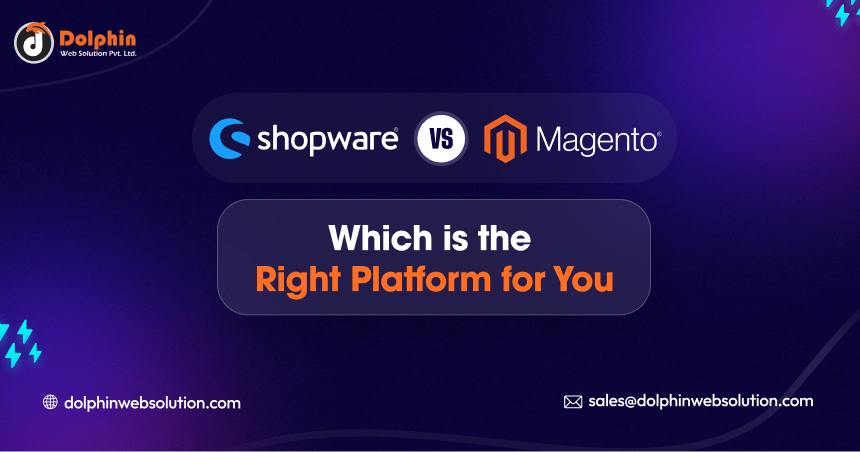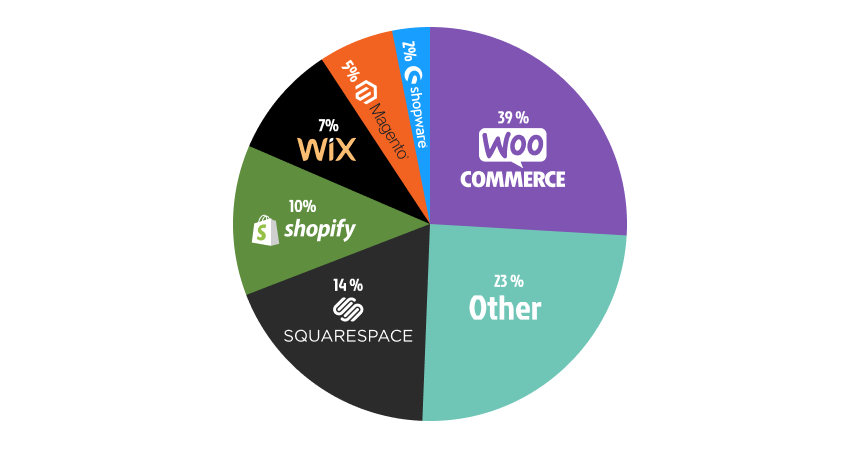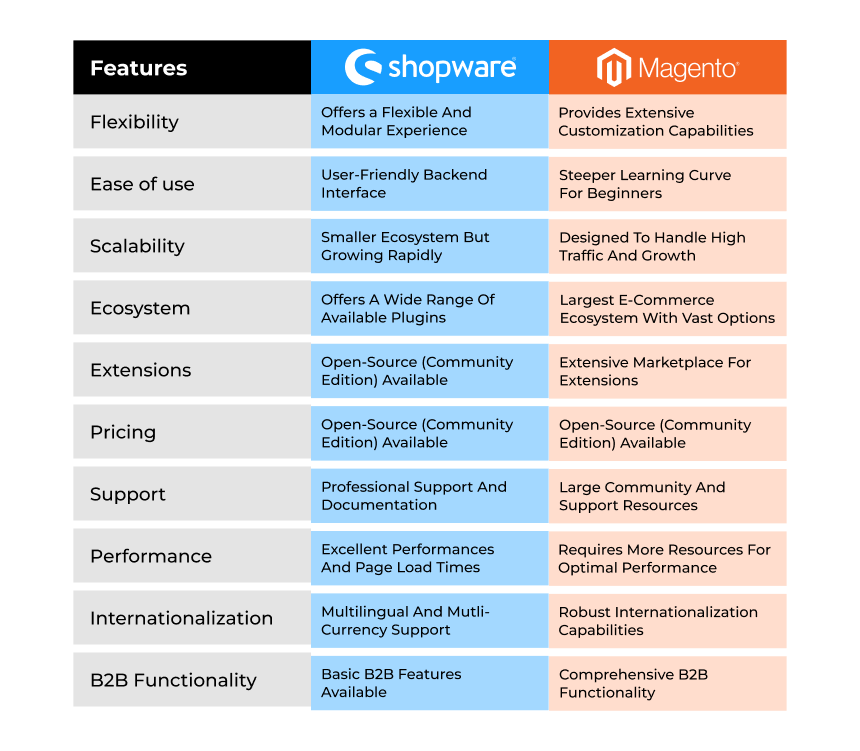Shopware Vs Magento – Which Is The Right Platform For You

Table of Contents
- 1 Introduction to Shopware and Magento
- 2 Comparison of Shopware and Magento Features
- 3 Comparison Between: Shopware vs Magento Pricing
- 4 Ease of Use Comparison between Shopware and Magento
- 5 Performance & Security Comparison between Shopware and Magento
- 6 Customization Options Comparison between Shopware and Magento
- 7 Who Should Use Shopware?
- 8 Who Should Use Magento?
- 9 Conclusion
Summary :
Shopware has an intuitive content management system, a user-friendly interface, and a strong emphasis on the user experience. On the other hand, Magento boasts a sizable ecosystem of extensions, extensive customization options, and solid scalability. The relative merits of Shopware and Magento must be carefully weighed when choosing one over the other for your e-commerce platform.
Do you currently operate an online store or have plans to do so soon? If so, selecting the best eCommerce platform is essential to the success of your company. Choosing which product would best suit your needs can be overwhelming with so many options on the market. In this blog post, we’ll compare two well-known platforms, Shopware and Magento, to make it easier for you to decide which one is the best fit for your particular needs. So fasten your seatbelts and let’s begin this fascinating comparison!
Introduction to Shopware and Magento
Shopware and Magento are both popular e-commerce platforms used for building online stores and managing online businesses.

What is Shopware?
Shopware is a platform for building online stores that is based in Germany and offers a variety of features. It offers an intuitive backend management system, a user-friendly interface, and a modular architecture that supports customization and scalability. Shopware offers a range of features, including responsive design, marketing tools, multilingual and multi-currency support, and SEO optimisation. It also provides a marketplace where users can purchase plugins and extensions to expand the platform’s functionality. When deciding between Shopware and Magento for your e-commerce platform, it’s crucial to consider the expertise of a Hire shopware developer.
What is Magento?
An extensive set of features are offered by the popular open-source e-commerce platform Magento, which is used by many online retailers. It has a wide range of adaptability, scalability, and customization options. Magento has a sizable community and a vast ecosystem with a variety of extensions and themes to increase the functionality of the platform. It supports sophisticated features like multi-store management, order management, payment integration, inventory management, catalogue management, and potent SEO capabilities. Magento has a reputation for being able to manage heavy traffic and expansive product catalogues. If you’re thinking about using Magento as your online store platform, You can hire a Magento developer for a game-changer.
Both platforms have their strengths and are suitable for different types of businesses, depending on specific requirements and preferences.
So, what’s the difference between these two platforms? Let’s take a look:
Comparison of Shopware and Magento Features
When it comes to choosing an eCommerce platform, there are a lot of factors to consider. Two of the most popular platforms on the market are Shopware and Magento.
To help you make a decision, we’ve put together a comparison of Shopware and Magento features. Keep reading to learn more about each platform and what they have to offer.

Comparison Between: Shopware vs Magento Pricing
Pricing is one of the key distinctions between Shopware and Magento. There are three versions of Shopware: the Community Edition, which is free, the Professional Edition, which has a monthly charge that starts at €399, and the Enterprise Edition, which has a variable price. Additionally, there are three different editions of Magento: the Community Edition, which is free; the Enterprise Edition, which has a starting annual price of $15,550; and the Commerce Cloud, which has a starting annual price of $40,000.
As you can see, Magento offers less pricing transparency than Shopware. To receive a tailored quote for Magento’s Enterprise Edition or Commerce Cloud, get in touch with their sales team.
To use Shopware’s software, you must pay a monthly fee in accordance with their subscription-based pricing model. Basic, Professional, and Enterprise are the possible grades. The monthly fees for the Basic plan are $69, the Professional plan is $229, and the Enterprise plan is $689.
On the other hand, Magento offers a free to download and use open-source community edition. However, you must join up for their Commerce Cloud platform, which costs $2488 per year, if you want to use their enterprise-level features and support.
Ease of Use Comparison between Shopware and Magento
Both Shopware and Magento have excellent user interfaces.
Shopware is renowned for being user-friendly. The platform is simple to use, making it perfect for companies that are just starting out with eCommerce. On the other hand, Magento is a more sophisticated platform that provides a variety of features and possibilities. Because of this, it is better suited for companies searching for a platform with more sophisticated capabilities and firms with more eCommerce experience.
Performance & Security Comparison between Shopware and Magento
When choosing an e-commerce platform, performance and security are essential factors. Here is a summary of Shopware and Magento’s performance and security features:
Shopware
Excellent Performance
Shopware is renowned for its powerful performance and quick page load times, which help to ensure that customers have a seamless and easy time purchasing.
Mechanisms for Caching
Shopware uses a variety of caching techniques, including HTTP caching and template caching, to enhance performance and speed up server responses.
Effective Resource Management
Shopware effectively handles server resources, easing the burden on the hosting environment.
Security Updates
Shopware regularly issues security updates to patch vulnerabilities and maintain the platform’s security. Security.
Secure Coding Standards
Shopware adheres to secure coding standards to reduce the possibility of security breaches.
security Plugins and Extensions
Shopware provides a variety of security plugins and extensions in its marketplace to improve the security features of the platform.
Data Protection
Shopware complies with data protection laws by offering tools for GDPR compliance and features like cookie consent management.
Magento:
Scalability and High Traffic Handling
Magento is built to support vast product catalogues and high traffic, ensuring performance even as businesses expand.
Full-page Caching
By delivering pre-rendered pages, lowering the server load, and enhancing response times, Magento uses full-page caching to optimise performance.
Indexing and Optimisation
To improve search functionality and query performance, Magento makes use of indexing and optimisation techniques.
Security
Regular security patches to fix flaws and guarantee the security of the platform, Magento regularly releases security patches and upgrades.
Restricting User Access
To private portions of the platform is possible thanks to Magento’s strong access controls and permissions management.
Secure coding Guidelines
Magento adheres to secure coding guidelines to reduce the possibility of security breaches.
Security Add-ons and Extensions
To strengthen the platform’s security features, a variety of security add-ons and extensions are available in the Magento marketplace.
Payment Card Industry Data Security Standard (PCI-DSS) Compliance
Magento complies with PCI-DSS compliance regulations, providing safe payment processing.
Customization Options Comparison between Shopware and Magento
There are several factors to consider when deciding which eCommerce platform is right for you, and customization options are one of them. Both Shopware and Magento offer a variety of customization options to suit your specific needs.
Shopware’s Customization Pptions Include
– Adding or removing shop components
– Customizing the look and feel of your shop with themes and template overrides
– Installing and configuring plugins to add functionality to your shop
– Creating custom modules to add bespoke functionality to your shop
Magento’s Customization Options Include
– Changing the layout of your store pages
– Adding or removing store components
– Customizing the look and feel of your store with themes and template overrides
– Installing and configuring extensions to add functionality to your store
– Creating custom modules to add bespoke functionality to your store
Pros and Cons of Magento vs Shopware
When comparing Magento and Shopware, there are several pros and cons to consider based upon their significance and your application. You can choose the one which fits you the best.
Pros Of Shopware Ecommerce Platform
Flexibility and Customization
Shopware offers a modular architecture that allows for extensive customization and flexibility, enabling businesses to tailor their online stores according to their specific needs.
Strong Performance
Shopware is known for its excellent performance and fast page load times, ensuring a smooth and seamless shopping experience for customers.
Multilingual and Multi-currency Support
Shopware provides built-in support for multilingual and multi-currency functionality, making it suitable for businesses targeting international markets.
Growing Ecosystem
While not as large as some other platforms, Shopware’s ecosystem is rapidly expanding, offering a growing selection of plugins and extensions.
Cons Of Shopware Ecommerce Platform
Limited Marketplace
Shopware’s marketplace for plugins and extensions is not as extensive as some other platforms, which may result in a more limited range of available add-ons.
Steeper Learning Curve
Although the backend interface is user-friendly, newcomers to Shopware may experience a learning curve to fully understand and utilize its advanced features and customization options.
Pros Of Magento Ecommerce Platform
Large Feature Set
Magento is suitable for companies with complex requirements since it provides a wide range of features, such as sophisticated inventory management, powerful catalogue management, and strong SEO skills.
Scalability
Magento offers scalability and performance even as businesses expand. It is built to handle high traffic and big product catalogues.
Huge Ecosystem
Magento offers a sizable ecosystem with a variety of plugins, extensions, and themes readily available in its marketplace, allowing businesses to effortlessly expand and improve their online stores.
Community and Support
Magento has a sizable and vibrant developer and user community that offers a plethora of information, support, and documentation.
Cons Of Magento Ecommerce Platform:
Steeper Learning Curve
A steeper learning curve because of Magento’s more complicated architecture and setup procedure, which demands users to put in more time and effort to become proficient in using and maintaining the platform.
Resource-intensive
For larger web stores, Magento may need additional server resources and technical know-how to work at its best.
Cost Factors
Although Magento has an open-source Community Edition, the Enterprise Edition and further extensions may be more expensive, making them less appropriate for smaller enterprises with tighter budgets.
The decision between Shopware and Magento ultimately comes down to the particular needs, financial constraints, and technological know-how of a company. Which platform best suits the particular requirements of an online store can be determined by weighing these advantages and disadvantages.
Who Should Use Shopware?
Businesses that value performance, flexibility, and user-friendliness might consider Shopware.
1. Small to Medium-sized Companies
Shopware is accessible to companies with little technological know-how because of its user-friendly interface and simple backend maintenance.
2. Companies with a Global Presence
Shopware is a great option for businesses looking to expand into foreign markets because it comes with built-in support for multilingual and multi-currency capabilities.
3. Business Personalization
Businesses that appreciate personalization may build their online stores to meet their unique demands and branding requirements thanks to Shopware’s modular architecture and wide range of customization possibilities.
4. Enterprises that are Expanding
Shopware is a good choice for expanding enterprises because of its performance and scalability.
5. Businesses looking for an Environment that is Fast Increasing:
Shopware has a smaller ecosystem than some other platforms, but it is expanding quickly and offers a wide range of plugins and extensions to increase the functionality of the platform.
Who Should Use Magento?
A strong e-commerce platform called Magento serves companies with more complicated needs and a focus on scalability. It is suitable for:
1. Large Corporations and Well-established Businesses
Due to its extensive feature set and scalability, Magento is the perfect solution for companies that need to maintain a complicated catalogue, have many storefronts, and sell a large number of products.
2. Businesses with Technical Know
For best usage and customization, Magento’s more sophisticated architecture and setup procedure require a higher level of technical know-how.
3. Businesses that Demand Considerable Customization
Due to Magento’s flexibility, businesses may completely customize their online stores, making it a good fit for organisations that have specific branding and functionality needs.
4. Organisations Aiming for High Traffic
Magento is a good option for organisations anticipating significant growth and significant visitor counts due to its capacity to handle high traffic and extensive product catalogues.
5.Businesses Seeking a Zizable Ecosystem And Active Community
Magento has a sizable ecosystem with a wide variety of plugins and extensions as well as an active community that supports developers and retailers by offering tools and support.
The decision between Shopware and Magento ultimately comes down to the particular requirements, financial constraints, and technical skills of a business. Which platform best fits the needs of the online store can be determined by carefully weighing these considerations.
Conclusion
Which of the two e-commerce platforms you choose for your store will depend on your demands. Shopware and Magento are both excellent options. Magento can be the best option for you if you need a feature-rich platform with excellent customization capabilities. On the other hand, Shopware is a good option to take into account if you want a simple solution that provides quick loading times and simple navigation. It is ultimately up to you to select the one that best meets your needs. Contact Dolphin Web Solution for Shopware development service.


